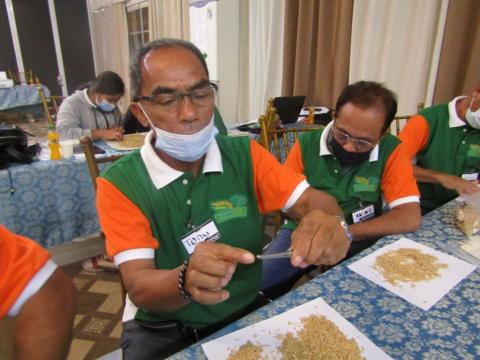Training participants inspect rice seeds during varietal selection
Central Visayas – A continuous and reliable supply of high-quality inbred rice seeds is one of the major goals of the Department of Agriculture. Adequate and continuous rice seed ensures seed security, farm productivity. Thus, directly contribute to attaining rice sufficiency in the country. The importance of seed inspectors in attaining this goal is immense as they play a significant role in the monitoring of the production of high-quality inbred rice seeds.
On August 10-12, 2021, a Refresher Training Course on Inbred Rice Seed Production and Certification for Seed Inspectors was conducted in Panda Tea Garden Suites, Tagbilaran City, Bohol. It was a regionwide training which also targeted seed inspectors from other provinces such as Cebu, Negros Oriental and Siquijor. Participants from Cebu, Negros Oriental and Siquijor joined the training virtually through the Google Meet platform.
Twenty-seven (27) seed inspectors from the municipalities of Alicia, Bilar, Carmen, Catigbian, Dagohoy, Duero, Garcia Hernandez, Mabini, San Miguel, Sierra Bullones, Tagbilaran City, and Ubay in Bohol; Argao in Cebu; Bindoy (Payabon), Canlaon City, City of Bayawan (Tulong), Dumaguete City, Mabinay, Sibulan, and Zamboanguita in Negros Oriental; and Siquijor have attended the three-day training.
The training aims to provide in-depth knowledge and improve the seed inspectors’ capabilities in performing their functions and providing technical services to seed growers. During the three-day course, participants were able to learn about the mechanics, policies and guidelines on seed certification for inbred rice seed production; varietal selection and characteristics of the approved National Seed Industry Council (NSIC) varieties; insect pest management, integrated nutrient management, and integrated cultural management for rice seed production; harvest and post-harvest technology for rice seed production; seed testing procedures and standards; field inspection and rouging, seed sampling, bagging and tagging. Further, the participants were informed about the status of implementation of the Rice Program in the region. They also further their knowledge on the roles of seed inspectors.
The training was made possible through the ATI RTC 7’s coordination and collaboration with the Bureau of Plant Industry - National Seed Quality Control Services (BPI-NSQCS) - Region 7. People who have shared their expertise include Jonathan O. Sumagang from ATI – RTC 7; Rico Rommel A. Varquez; Wilfreda C. Malayao, Felix Tubiano from DA- RFO 7; Rogelio Davalan from DA – Soil and Water Research and Development Station (SWRDS); Marcheta Brina from BPI – NSQCS; and Lorebien Lagapa from Office of the Provincial Agriculture in Bohol.
The training was facilitated by Mr. Jonathan O. Sumagang, Charlou Ampit and Angelie B. Mencede from ATI-RTC 7.
“My other co-resource persons were knowledgeable on the topics with a high level of integrity and good judgements. In the future, it would be great if there will be training around rice production for agricultural extension workers (AEWs), provision of MOET Kit and leaf color chart kit to the AEWs,” said Lorebien Lagapa - one of the training participants at the same time a resource person.
Should there be any clarifications or inquiries around this training, you may contact Jonathan O. Sumagang, Project Officer, through his email at jsumagang16@gmail.com.

